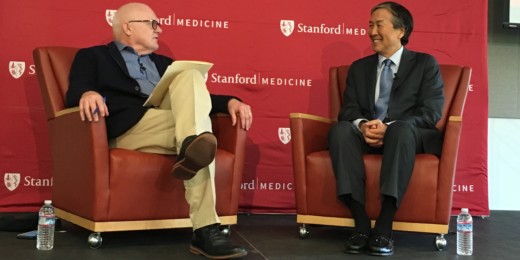Children aren’t getting access to many new medical devices, but the U.S. Food and Drug Administration is working to change that.
Category: Health Policy
What brain science tells us about family separations
A Stanford pediatric trauma expert discusses children's separation from their parents at the border and shares how childhood trauma can harm the brain.
Protecting children is up to us: Border policy illustrates need for advocacy
Pediatric resident Jennifer DeCoste-Lopez emphasizes the importance of nurturing caregivers and decries policies that separate children from parents.
At 94, Stanford’s Victor Fuchs celebrates his new book, dispenses wisdom
Victor Fuchs, known for his lifelong contributions to health economics, recently celebrated the publication of his new book "Health Economics and Policy: Selected Writings" with a talk on campus.
Most clinical trial participants find benefits of sharing personal data outweigh risks
Most participants in clinical trials believe the benefits of broadly sharing individual data outweigh the risks, a new Stanford study has found.
Fluctuations of Affordable Care Act enrollees jeopardize market stability
A working paper from Stanford scholars finds evidence that some consumers who buy their own insurance have taken advantage of the ACA provision preventing discrimination based on preexisting conditions to strategically pop in and out of coverage in ACA marketplaces.
Poll: Doctors say electronic health records need overhaul
A majority of primary care doctors report frustration with how electronic health records have affected their relationships with patients and with the amount of time required by the systems, according to a Stanford poll commissioned from The Harris Poll. However, many also say EHRs have led to improved patient care.
Outdated equations lead to incorrect prescriptions for cardiovascular conditions
A team of researchers has updated and improved the equations that guide prescribing decisions for physicians in the U.S. regarding cardiovascular risk.
Causes of physician burnout and way to address it
The president of the Association of American Medical Colleges details factors that contribute to physician burnout and broad cultural changes that can help.
Third-hand smoke increases asthma severity in mice
Exposure to 'third-hand smoke' — that is, the chemicals left behind on household surfaces after smoke has dissipated — increases the severity of asthma symptoms in mice. Stanford researchers are working to learn how this happens, and whether it might be possible to protect people with asthma from this exposure.
Prevention and health disparities demand greater attention, public health leader Howard Koh says
Howard Koh, MD, former assistant secretary of health in the Obama Administration, spoke recently in a Stanford Health Policy Forum discussion.
Say yes: Dinesh Palipana appeals for greater inclusivity, compassion in medicine at Medicine X | ED
Australian physician Dinesh Palipana advocated for the inclusion and acceptance of people with disabilities in medicine at Stanford Medicine X | ED.
A look at the Millennium Villages Project
Results from the Millennium Villages Project, an experimental effort to tackle poverty in Africa, are mixed, researchers say.
Community cooperation following disasters key to recovery, Stanford study finds
A Stanford study explores the factors that are important to help a community recover from a disaster such as an epidemic.
Dentistry in the hospital: A Q&A
Dyani Gaudilliere discusses the role of Stanford’s hospital dentists and the need for a more integrated approach to dentistry.
Despite policies, tobacco products marketed on Facebook, Stanford researchers find
Facebook prohibits paid tobacco advertising, but Stanford researchers found brands and vendors marketing their products through unpaid content, in apparent conflict with the rules or their spirit.

















